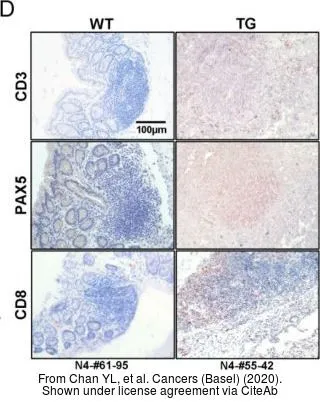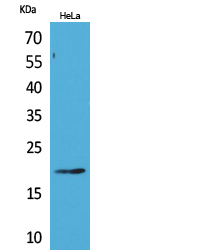![IHC-P analysis of human tonsil tissue using GTX16669 CD3 antibody [SP7]. IHC-P analysis of human tonsil tissue using GTX16669 CD3 antibody [SP7].](https://www.genetex.com/upload/website/prouct_img/normal/GTX16669/GTX16669_20191203_IHC-P_5_w_23060620_244.webp)
IHC-P analysis of human tonsil tissue using GTX16669 CD3 antibody [SP7].
CD3 antibody [SP7]
GTX16669
ApplicationsFlow Cytometry, ImmunoFluorescence, ImmunoCytoChemistry, ImmunoHistoChemistry, ImmunoHistoChemistry Frozen, ImmunoHistoChemistry Paraffin
Product group Antibodies
ReactivityHuman, Mouse, Porcine, Rat
TargetCD3D
Overview
- SupplierGeneTex
- Product NameCD3 antibody [SP7]
- Delivery Days Customer9
- Application Supplier NoteIHC-P: 1:25-1:50. *Optimal dilutions/concentrations should be determined by the researcher.Not tested in other applications.
- ApplicationsFlow Cytometry, ImmunoFluorescence, ImmunoCytoChemistry, ImmunoHistoChemistry, ImmunoHistoChemistry Frozen, ImmunoHistoChemistry Paraffin
- CertificationResearch Use Only
- ClonalityMonoclonal
- Clone IDSP7
- ConjugateUnconjugated
- Gene ID915
- Target nameCD3D
- Target descriptionCD3 delta subunit of T-cell receptor complex
- Target synonymsCD3-DELTA, CD3DELTA, IMD19, T3D, T-cell surface glycoprotein CD3 delta chain, CD3 antigen, delta subunit, CD3 delta, CD3d antigen, delta polypeptide (TiT3 complex), CD3d molecule, delta (CD3-TCR complex), OKT3, delta chain, T-cell receptor T3 delta chain
- HostRabbit
- IsotypeIgG
- Protein IDP04234
- Protein NameT-cell surface glycoprotein CD3 delta chain
- Scientific DescriptionThe protein encoded by this gene is part of the T-cell receptor/CD3 complex (TCR/CD3 complex) and is involved in T-cell development and signal transduction. The encoded membrane protein represents the delta subunit of the CD3 complex, and along with four other CD3 subunits, binds either TCR alpha/beta or TCR gamma/delta to form the TCR/CD3 complex on the surface of T-cells. Defects in this gene are a cause of severe combined immunodeficiency autosomal recessive T-cell-negative/B-cell-positive/NK-cell-positive (SCIDBNK). Two transcript variants encoding different isoforms have been found for this gene. Other variants may also exist, but the full-length natures of their transcripts has yet to be defined. [provided by RefSeq, Feb 2009]
- ReactivityHuman, Mouse, Porcine, Rat
- Storage Instruction2°C to 8°C
- UNSPSC12352203
References
- Morita TY, Yu J, Kashima Y, et al. CDC7 inhibition induces replication stress-mediated aneuploid cells with an inflammatory phenotype sensitizing tumors to immune checkpoint blockade. Nat Commun. 2023,14(1):7490. doi: 10.1038/s41467-023-43274-3Read this paper
- Mascarau R, Woottum M, Fromont L, et al. Productive HIV-1 infection of tissue macrophages by fusion with infected CD4+ T cells. J Cell Biol. 2023,222(5). doi: 10.1083/jcb.202205103Read this paper
- Jang B, Song HK, Hwang J, et al. Shed syndecan-2 enhances colon cancer progression by increasing cooperative angiogenesis in the tumor microenvironment. Matrix Biol. 2022,107:40-58. doi: 10.1016/j.matbio.2022.02.001Read this paper
- Shmuel-Galia L, Humphries F, Lei X, et al. Dysbiosis exacerbates colitis by promoting ubiquitination and accumulation of the innate immune adaptor STING in myeloid cells. Immunity. 2021,54(6):1137-1153.e8. doi: 10.1016/j.immuni.2021.05.008Read this paper
- He S, Wang X, Liu Z, et al. Hydroxysafflor Yellow A Inhibits Staphylococcus aureus-Induced Mouse Endometrial Inflammation via TLR2-Mediated NF-kB and MAPK Pathway. Inflammation. 2021,44(3):835-845. doi: 10.1007/s10753-020-01297-8Read this paper
- Sun Z, Nyberg R, Wu Y, et al. Developing an enhanced 7-color multiplex IHC protocol to dissect immune infiltration in human cancers. PLoS One. 2021,16(2):e0247238. doi: 10.1371/journal.pone.0247238Read this paper
- Heffer A, Wang V, Sridhar J, et al. A Mouse Model of Proliferative Vitreoretinopathy Induced by Intravitreal Injection of Gas and RPE Cells. Transl Vis Sci Technol. 2020,9(7):9. doi: 10.1167/tvst.9.7.9Read this paper
- Chan YL, Lai WC, Chen JS, et al. TIAM2S Mediates Serotonin Homeostasis and Provokes a Pro-Inflammatory Immune Microenvironment Permissive for Colorectal Tumorigenesis. Cancers (Basel). 2020,12(7). doi: 10.3390/cancers12071844Read this paper
- Umar S, Palasiewicz K, Van Raemdonck K, et al. IRAK4 inhibition: a promising strategy for treating RA joint inflammation and bone erosion. Cell Mol Immunol. 2021,18(9):2199-2210. doi: 10.1038/s41423-020-0433-8Read this paper
- Chen PM, Pan WY, Wu CY, et al. Modulation of tumor microenvironment using a TLR-7/8 agonist-loaded nanoparticle system that exerts low-temperature hyperthermia and immunotherapy for in situ cancer vaccination. Biomaterials. 2020,230:119629. doi: 10.1016/j.biomaterials.2019.119629Read this paper







